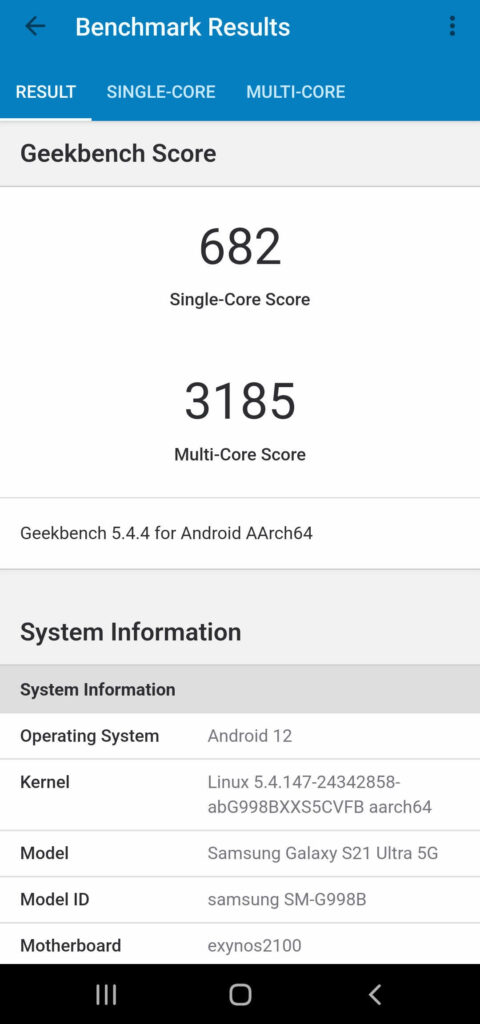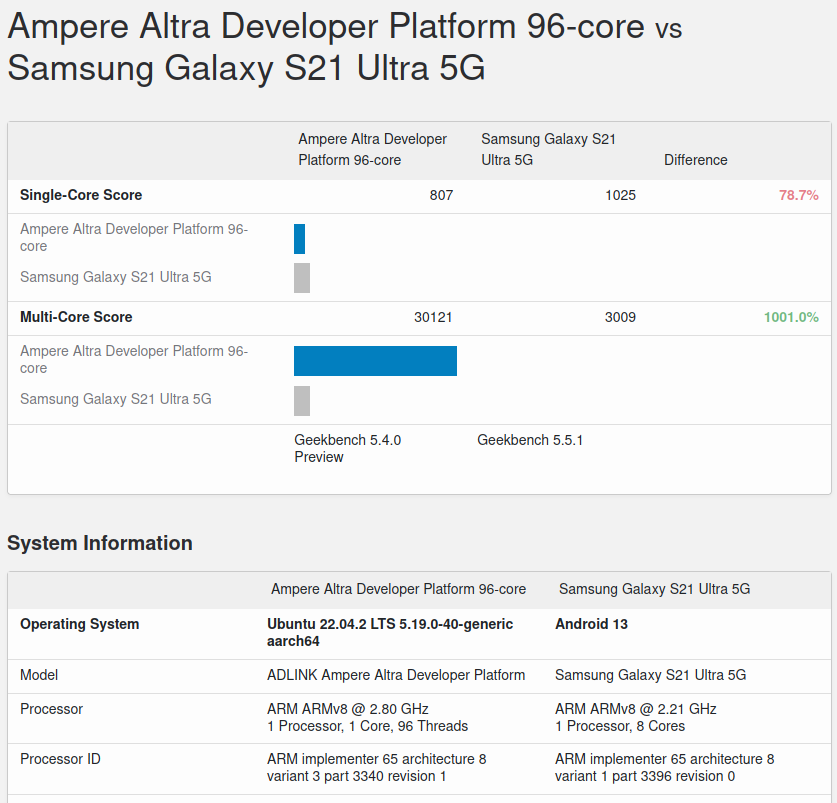There are not a lot of cross OS and cross CPU benchmarks and the user might know https://www.userbenchmark.com/ which is like Geekbench but only for windows
geekbench.com is multi OS (not all) and multi (not all) CPU (developed by primatelabs.com 602-1 Eglinton Avenue East Toronto, Ontario, Canada M4P 3A1) makes it (Samsung’s Game Optimizing Service (GOS) NOT cheating this time, they are just throttling CPU/GPU performance for every day tasks to mitigate overheating and battery drain 😀) easier for the first time to compare Desktop CPUs (mostly x86) with mobile CPUs (mostly ARM) and just all kinds of hardware that can run GNU Linux, OSX, Windows and Android.
Problem:
- it’s not open source
- Geekbench 6 is not available for all CPU architectures, Geekbench 5 is (except for Android? hard to find download link) but Geekbench 6 results can not be compared to Geekbench 5 results
- what it is computing exactly can be read in the internals.pdf
- GPU testing is only available for windows (#wtf)
But the v6 results mobile vs desktop CPU comparison results are interesting, but as said, v6 is not available for all CPUs 🙁
how to run it?
- download the binary https://www.geekbench.com/download/linux/
- unpack
- run it like ./Geekbench-6.0.3-Linux/geekbench_x86_64
- wait for the results to come in
- WARNING! it will automatically upload the hardware details and benchmark results to
what does the user get?
- the terminal (no gui) based benchmark runs for about 10min
- will display basic hardware information in terminal
- will display basic results in terminal
- but will also upload it’s results automatically to “the mothership” https://www.geekbench.com/
- if for privacy reasons the user does not want the results to be publicly available, this benchmark might not be what the user wants.
- it will output a link to the online results where the user can click on “set baseline” to compare this system to other systems’s performance.
- so how will this ASUS AMD A10-5800K system from 2013 (was 400 bucks 10 years ago) perform against an recent ARM SoC?
here is a sample output:
./Geekbench-6.0.3-Linux/geekbench_x86_64 Geekbench 6.0.3 : https://www.geekbench.com/ Geekbench 6 requires an active internet connection and automatically uploads benchmark results to the Geekbench Browser. Upgrade to Geekbench 6 Pro to enable offline use and unlock other features: https://store.primatelabs.com/v6 Enter your Geekbench 6 Pro license using the following command line: ./Geekbench-6.0.3-Linux/geekbench_x86_64 --unlock Running Gathering system information System Information Operating System Debian GNU/Linux 11 (bullseye) Kernel Linux 5.10.0-23-amd64 x86_64 Model System manufacturer System Product Name Motherboard ASUSTeK COMPUTER INC. F2A85-M LE BIOS American Megatrends Inc. 6504 CPU Information Name AMD A10-5800K Topology 1 Processor, 2 Cores, 4 Threads Identifier AuthenticAMD Family 21 Model 16 Stepping 1 Base Frequency 3.80 GHz L1 Instruction Cache 64.0 KB x 2 L1 Data Cache 16.0 KB x 4 L2 Cache 2.00 MB x 2 Memory Information Size 14.9 GB Single-Core Running File Compression Running Navigation Running HTML5 Browser Running PDF Renderer Running Photo Library Running Clang Running Text Processing Running Asset Compression Running Object Detection Running Background Blur Running Horizon Detection Running Object Remover Running HDR Running Photo Filter Running Ray Tracer Running Structure from Motion Multi-Core Running File Compression Running Navigation Running HTML5 Browser Running PDF Renderer Running Photo Library Running Clang Running Text Processing Running Asset Compression Running Object Detection Running Background Blur Running Horizon Detection Running Object Remover Running HDR Running Photo Filter Running Ray Tracer Running Structure from Motion Uploading results to the Geekbench Browser. This could take a minute or two depending on the speed of your internet connection. Upload succeeded. Visit the following link and view your results online: https://browser.geekbench.com/v6/cpu/1373376 Visit the following link and add this result to your profile: https://browser.geekbench.com/v6/cpu/1373376/claim?key=XXXXXX What Geekbench for GNU Linux will NOT do is test the GPU, so this is strictly CPU + storage in very general ("File compression") or specialized scenarios such as "Photo Filter".
To test the GPU 3D Mark mobile and for Desktop would be better.
- 3DMark (windows only basic version for free on steam)
- 3DMark for Android
- 3DMark for iOS
- they even keep available all the legacy benchmarks, but none was compilred to run under GNU Linux 🙁
the results are interesting…
The Samsung S21 Ultra SoC (ARMv8 @ 2.21 GHz 1 Processor, 8 Cores) is:
- +250% faster than ASUS AMD A10-5800K system from 2013 (Whaaaat?)
- +49.0% faster than: i5 on lenovo t440 https://browser.geekbench.com/v6/cpu/1308928
- +18.1% faster than i5 on Apple Inc. iMac16,2 https://browser.geekbench.com/v6/cpu/1295009/
- +7.9% faster than Samsung Galaxy Tab S7 https://browser.geekbench.com/v6/cpu/1299751
- –69.1% slower (single core) -43.1% slower (multicore) than AMD Ryzen 5 5600G
- running OS windows
- single core: 1967
- multicore: 7950
- running OS GNU Linux Debian 12
- single core: 2123 (+7.93% FASTER THAN ON WINDOWS!)
- multicore: 8946 (+12.52% FASTER THAN ON WINDOWS!)
- running OS windows
once more show the dominance RISC will play over CISC in the coming future with ARM and RISC-V and others both on Desktop and Mobile and even datacenters with it’s (endless?) scalability?
| Processor | Apple M2 Max @ 3.67 GHz 1 Processor, 12 Cores |
ARM ARMv8 @ 2.21 GHz 1 Processor, 8 Cores |
ARM’s v9 is promising +30% over ARMv8, well that is nice, but look at the M-CPUs crushing everything!
Samsung S21 Ultra (a smart phone, a bit bulky) Geekbench 6 result https://browser.geekbench.com/v6/cpu/1308864
Geekbench5.4.4 result:
Samsung 3DMark Cheating?
- “1) On the Exynos 5410, Samsung was detecting the presence of certain benchmarks and raising thermal limits (and thus max GPU frequency) in order to gain an edge on those benchmarks“
- “2) On both Snapdragon 600 and Exynos 5410 SGS4 platforms, Samsung was detecting the presence of certain benchmarks and automatically driving CPU voltage/frequency to their highest state right away. Also on Snapdragon platforms, all cores are plugged in immediately upon benchmark detect.”(src: anandtech.com)
While is is of course “uncool” that in every day tasks the SoC is actually throttled to “save” states, but then in other words this is exactly what battery saving looks like on phones but also notebooks: less voltage & lower clock speeds = longer runtime, otherwise those smart phone batteries would not last 3h which would piss off even more users to the point of unusability.
So is “permanent battery saving” = cheating?
No it’s not, it’s just lack of cooling.
As for example a ODROID XU4 ARM SoC becomes UNTOUCHABLE HOT (definately more than 70°C) without active cooling.
But yes the user should be in charge and to decide if the SoC should run full speeds or half-speed.
For example it is pretty noticable that when re-encoding x264 to x265 (the S21 Ultra can re-encode 45min of StarTrek with this not so easy but it works ffmpeg App in aprox 5h but ONLY if it is plugged into charging ALL THE TIME, otherwise the CPU clock and voltage is throttled to “heat and battery optimized” levels and it would take 2x or 3x times as long.
Samsung’s Game Optimizing Service (GOS) NOT cheating this time, they are just throttling CPU/GPU performance for every day tasks to mitigate overheating and battery drain issues 😀
On one side it is understandable that (probably all vendrods) do that, on the other side it might mean: that there is a cooling issue and cooling needs to be improved to allow the SoC to run at 100% all the time.
Example: when filming 8k videos (which the S21 Ultra can do) but it can only do this for 10min not for 1h (as it is simply a massive demand on computational powers, but it can do it for 10min 😀 with HEIF: “High Efficiency Video Coding (HEVC = x265) is an image and video encoding format and the default image codec used with HEIF“.
Most Desktop CPUs in 2023 struggle to play 8k because of the massive computing power required and (still) lack of hardware x265 decoding (a codec that is doing even more compression on a video stream than x264 demanding more computing power)
how are those ARM Ampera servers performing?
https://browser.geekbench.com/v5/cpu/21070727 https://www.tomshardware.com/news/ampere-unveils-192-core-cpu
“On modern chip architectures, software support is just as important as the hardware itself to unlock all the performance” (https://www.jeffgeerling.com/blog/2023/testing-96-core-ampere-altra-developer-platform)
Ampere Altra Max (96 core ARM) vs S21 Ultra: https://browser.geekbench.com/v5/cpu/compare/21070727?baseline=21247504
so single core wise the S21 ultra is actually +30% faster, but mutli core the Ampere Altra Max is like 10x S21 SoC.
and while this comparison is probably “somewhat” valid, it is not exact, as it is not the exact version of the benchmark: “These changes mean Geekbench 5.1 scores will be higher than Geekbench 5.0 scores. As a result, we recommend users not compare Geekbench 5.0 and Geekbench 5.1 results.” (src)
what about RISC-V?: Geekbench 5 binaries available
| Linux/ARM | Requires Ubuntu 16.04 LTS or later | Linux/ARM Download |
| Linux/RISC-V | Requires Ubuntu 16.04 LTS or later | Linux/RISC-V Download |
Also Geekbench 5.4 binary available https://www.geekbench.com/blog/2021/03/geekbench-54/
“Preview support for Linux/ARM and Linux/RISC-V Preview builds are available for Linux/ARM and Linux/RISC-V.”
related:
http://serverbear.com/ this one shutdown and was a nice way to compare server capabilities (including available bandwidth).
liked this article?
- only together we can create a truly free world
- plz support dwaves to keep it up & running!
- (yes the info on the internet is (mostly) free but beer is still not free (still have to work on that))
- really really hate advertisement
- contribute: whenever a solution was found, blog about it for others to find!
- talk about, recommend & link to this blog and articles
- thanks to all who contribute!





